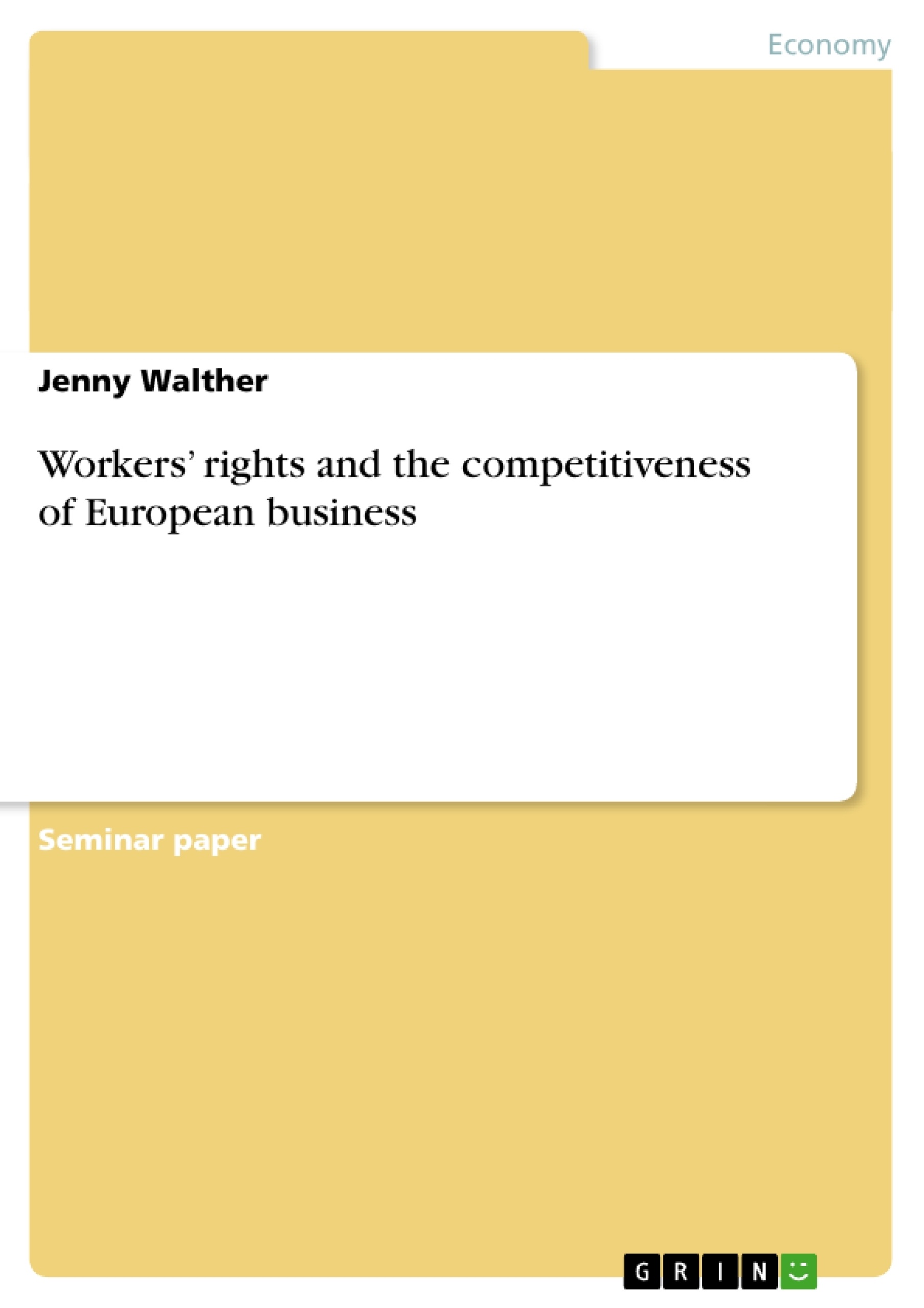Nowadays, “unemployment is [...] regarded as Europe’s foremost economic and social problem” (Artis and Weaver, 1997:52); and employment regulations as part of European social policy are a topic of ever-increasing importance.
Social policy does not only seek to provide services and redistribute income, but also regulates and influences the labour market (see Purdy, 1997:270). The concept and understanding of social policy has changed significantly over time. Although the historical development is beyond the scope of this essay, it should be noted that before the 1980s, economic objectives clearly dominated social dimensions, whereas today a more balanced approach is taken to economics and social aspects (see Hantrais, 2000:221).
Here, emphasis will be given to the current situation; nevertheless, the discussion should be perceived in the context of social policy evolution. Furthermore, social policy-making is closely linked to structural changes within the European labour market (see Mercado et al., 2001:204) and is, therefore, an on-going process rather than a static picture.
The first section of this essay will give a short explanation of the statement in discussion. Afterwards, the necessity of European social policy and its benefits to business shall be examined. In the following, potential drawbacks and obstacles to competitiveness will be highlighted. The final part summarises the line of argument and provides a future outlook on the subject.
Inhaltsverzeichnis (Table of Contents)
- Introduction
- Clarification of the Statement
- Workers' Rights
- Competitiveness of European Business
- The Benefits of Social Policy to Business
- The Need for European Social Policy
- Social Policy – Net Benefit or Cost?
- Social Policy – An Obstacle to Competitiveness?
- The Concepts of Labour Market Flexibility and Mobility
- Reduced Flexibility through Employment Regulations
- Prevailing Differences between Member States
- Discussion
- Conclusion
- Future Outlook
- References
Zielsetzung und Themenschwerpunkte (Objectives and Key Themes)
This essay aims to investigate the statement that "a pre-occupation with workers' rights has acted, and continues to act, as a brake on the competitiveness of European business." It analyzes the impact of social policy on the competitiveness of European businesses, considering both potential benefits and drawbacks. The essay examines the need for social policy in the European Union, its potential impact on labor market flexibility, and the differing regulations across Member States.
- The relationship between workers' rights and the competitiveness of European business.
- The benefits of social policy for businesses, including the harmonization of workers' rights and the need for social insurance.
- The potential drawbacks of social policy, including the potential for reduced flexibility and competitiveness.
- The impact of differing national social regulations on market integration and competition within the EU.
- The ongoing evolution of social policy and its implications for labor market dynamics in the European Union.
Zusammenfassung der Kapitel (Chapter Summaries)
The introduction provides context and lays out the essay's focus. The statement under discussion is clarified by defining terms like 'workers' rights' and 'competitiveness of European business'. The benefits of social policy to business are then explored, highlighting the need for harmonization across Member States and the importance of social insurance. The final section explores potential drawbacks, including reduced flexibility and competitiveness caused by employment regulations, as well as the differences in social regulations between Member States.
Schlüsselwörter (Keywords)
The essay focuses on key concepts such as social policy, workers' rights, competitiveness, European business, labor market flexibility, and market integration. The discussion touches on the implications of harmonization, social dumping, social insurance, and the need for a balanced approach to economic and social considerations within the European Union.
Frequently Asked Questions
Do workers' rights act as a brake on European business competitiveness?
The essay investigates this claim, analyzing whether social policies and employment regulations hinder or actually support the economic performance of businesses in the EU.
What are the benefits of European social policy for businesses?
Benefits include the harmonization of labor standards across Member States, which prevents "social dumping" and creates a more stable and predictable market environment.
How do employment regulations affect labor market flexibility?
Critics argue that strict regulations can reduce the flexibility and mobility of the labor market, potentially making it harder for companies to adapt to economic changes compared to global competitors.
How has the concept of social policy evolved in the EU?
Before the 1980s, economic objectives dominated; today, the EU takes a more balanced approach, integrating social dimensions as a core part of its economic strategy.
What is "social dumping"?
Social dumping refers to the practice of using cheaper labor or lower social standards in one country to gain a competitive advantage over others, a practice the EU seeks to mitigate through social policy.
- Citation du texte
- Jenny Walther (Auteur), 2002, Workers’ rights and the competitiveness of European business, Munich, GRIN Verlag, https://www.grin.com/document/37769



